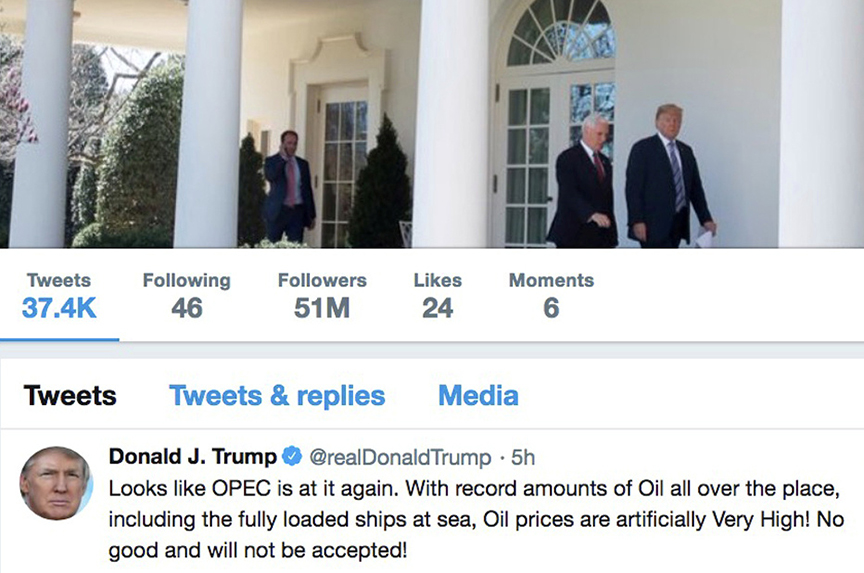 An increase in gas prices in the United States may have pushed US President Donald J. Trump to criticize the Organization of the Petroleum Exporting Countries (OPEC) in a tweet on April 20.
An increase in gas prices in the United States may have pushed US President Donald J. Trump to criticize the Organization of the Petroleum Exporting Countries (OPEC) in a tweet on April 20.
“Oil prices are artificially Very High! No good and will not be accepted!” Trump tweeted as OPEC and non-OPEC members met in Jeddah, Saudi Arabia, to assess their agreement to curtail production.
The tweet comes as the US benchmark for oil prices, WTI, is close to $69 per barrel, while the international benchmark Brent exceeded $73 per barrel. This is a record high since 2014 for both benchmarks. While Trump may be unhappy about continued increases in gas prices, which will offset the tax cuts for lower-income Americans, his policy decisions, along with geopolitical risks and the agreement between OPEC and non-OPEC members to curtail production all have an impact on oil prices.
Since 2014, oil-producing countries, particularly those whose economies are reliant on resource revenue, have been unhappy with the impact of low oil prices on their economy. As a result, OPEC member countries, along with other major non-OPEC producing countries like Brazil and Russia, came to an agreement in late 2016 to curtail oil production in an effort to balance global supply and demand and reduce oil storage. Thus far, this effort has largely stemmed the fall in oil prices and has slowly but surely driven a price recovery.
In response to Trump’s tweet, members of the agreement defended the higher oil prices as well as the curtailment agreement:
- OPEC president and the United Arab Emirates’ minister of energy and industry, Suhail Al Mazrouei, tweeted: “OPEC members are not targeting any price level rather targeting a well-balanced market and our efforts together with our partners from Non-OPEC alliance have helped the market rebalance and the oil industry.”
- Saudi Arabia’s energy minister, Khalid al-Falih, said that “there is no such thing as an artificial price.” Any changes in production should not “shock the market,” he said, adding that the OPEC+ alliance will not continue to reduce production “indefinitely,” and that the “markets should determine price.”
- Russia’s minister of energy, Alexander Novak, stated that it is the market that sets the price along with certain factors. “One of the ultimate factors being supply and demand, part of which is the US shale oil, which in turn is also affected by all the other market dynamics,” he said. Novak also pointed out that the price increase in the past two years has “driven the shale oil renaissance in the United States” and “if anything, the price surge has also benefitted the US shale oil industry.”
The oil market is also heavily influenced by geopolitical risks. The United States, as an increasingly unpredictable yet powerful global power, plays an important role in contributing towards these risks. For instance, while low oil prices have contributed to the collapse of Venezuela, an OPEC member country, US sanctions have worsened the situation. If the Trump administration decides to increase sanctions on Venezuela, it could tighten the market even further as production will likely continue to drop. Indeed, the situation is so dire that Venezuelan workers are emigrating. An intensified and prolonged downturn in Venezuelan production could lead to an increase in prices [Read The Collapse of the Venezuelan Oil Industry and Its Global Consequences for an in-depth analysis].
Venezuela is not the only area where US decision-making could have oil market implications. Trump also has an important decision to make by May 12 on whether to extend the sanctions waivers granted under Iran’s nuclear deal. If the Trump administration decides not to extend the sanctions waivers, it could lead to a return to sanctions on Iran’s energy sector and international companies that are investing in Iran, which in turn would lead to higher oil prices.
There is also some irony in Trump’s tweet, particularly in relation to the United States’ relations with Saudi Arabia. It was only a few weeks ago that Saudi Arabian Crown Prince Mohammed bin Salman was in the United States discussing with Trump strengthening US-Saudi ties by increasing investments. For any deals to take place between the United States and Saudi Arabia, oil prices will need to remain high.
While Trump may be angry about higher prices, he should perhaps be more aware of the impact his own decisions can have on oil prices. As the president of the United States, his words, actions, and lack of clarity on intended policies can have ripple effects in oil markets, which is driven in part by perceptions of risk and instability.
Bina Hussein is an associate director at the Atlantic Council’s Global Energy Center. Follow her on Twitter @BinaHussein.
Image: US President Donald J. Trump criticized high oil prices in a tweet on April 20. (Handout via Reuters)
